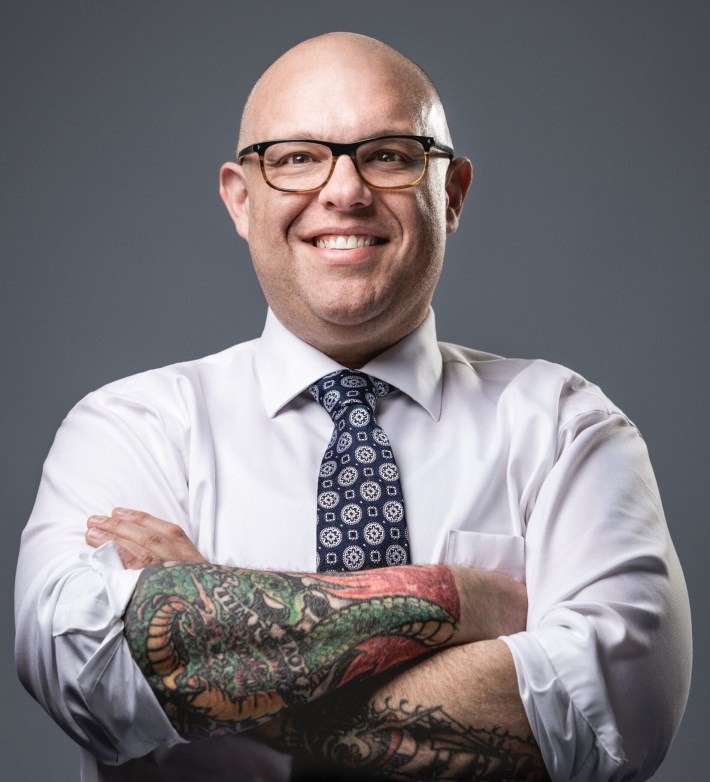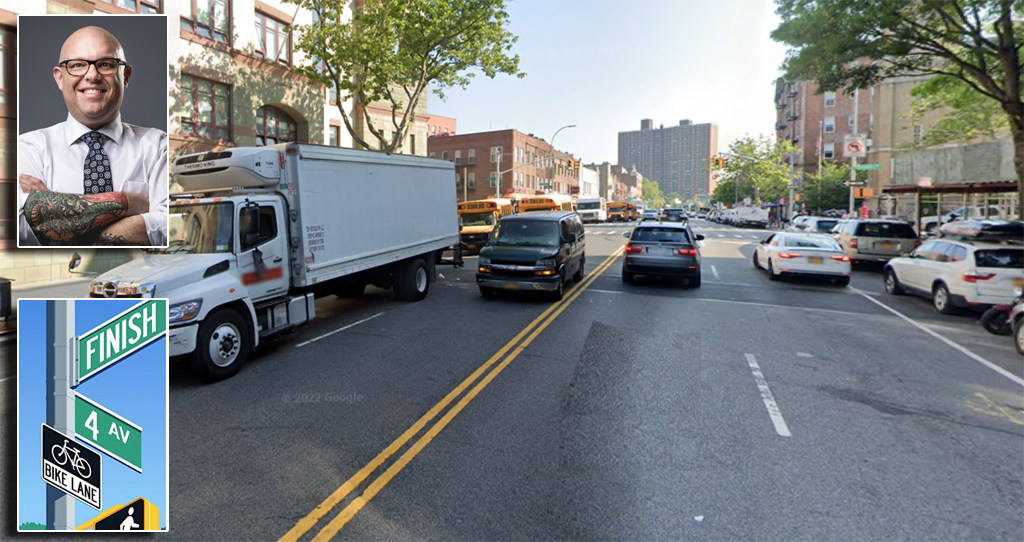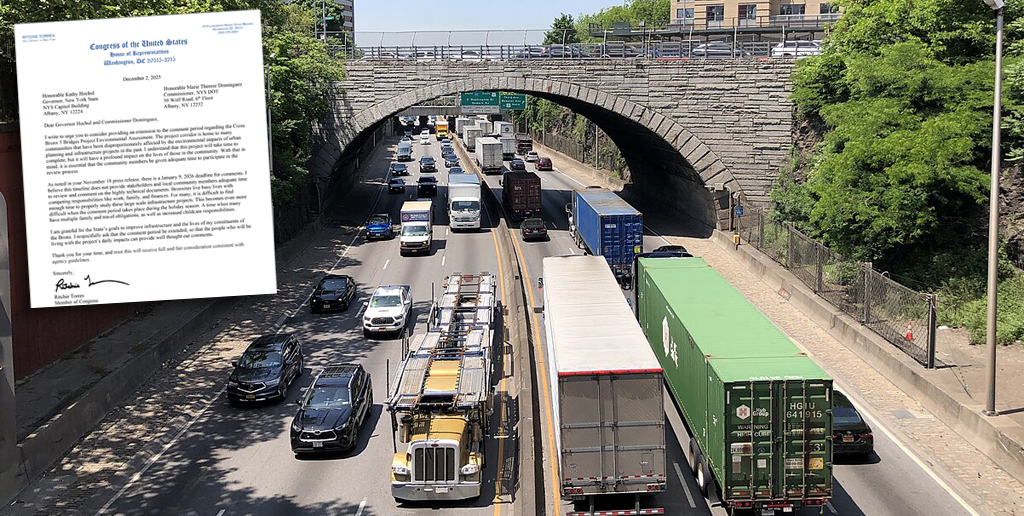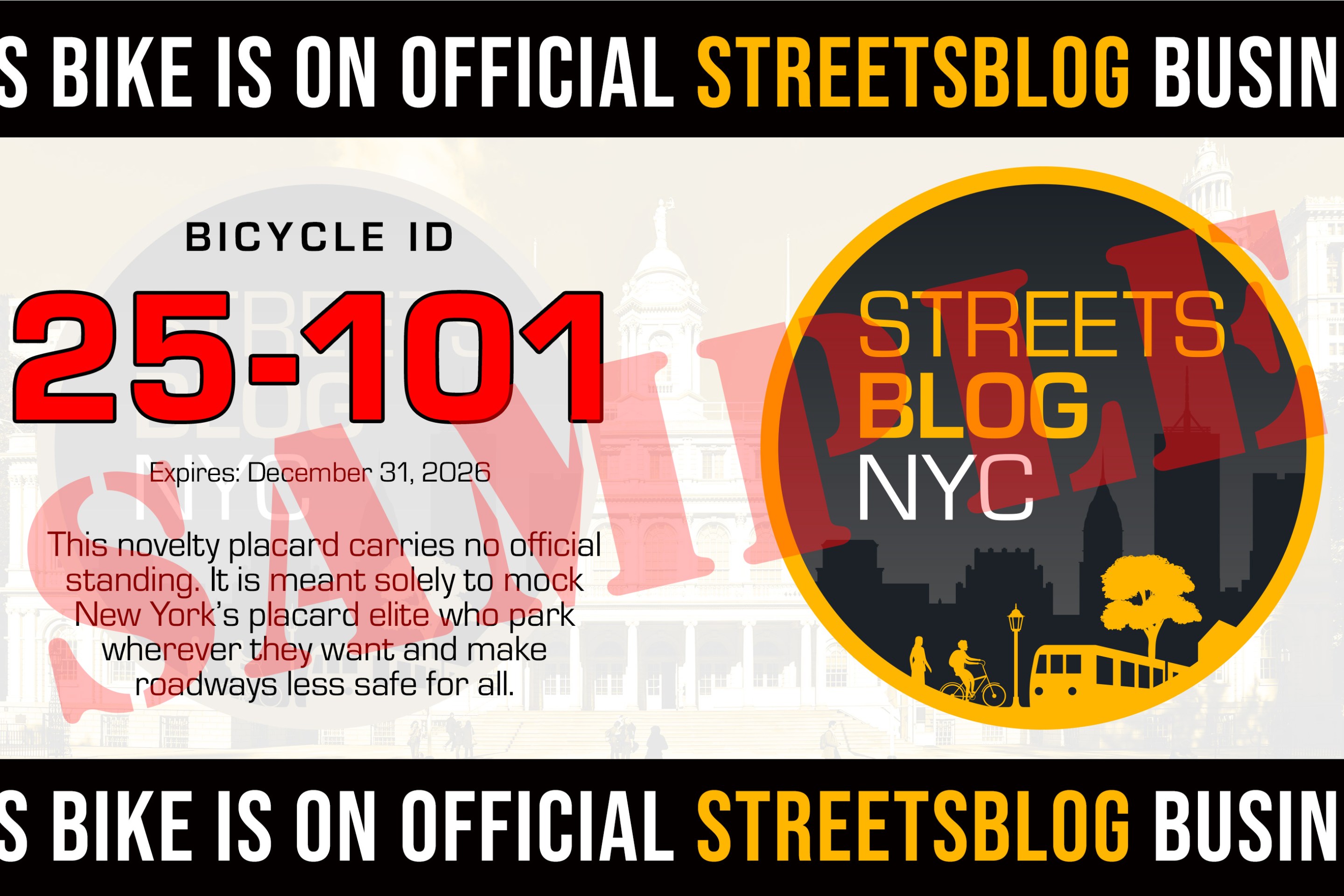It's time to finish the job.
Bay Ridge residents are urging the Department of Transportation to finally bring its successful redesign of the northern two-thirds of Fourth Avenue into the neighborhood — and, indirectly, forcing the neighborhood's City Council member to stop ducking the issue.

"Fourth Avenue remains inhospitable and dangerous for people whether they’re walking to the R train, riding their bike home, making deliveries via truck or trying to leave the neighborhood in a car," the coalition made up of Bike South Brooklyn, the Bay Ridge Environmental Group and Transportation Alternatives wrote in its petition to the city. "For the safety, mobility, and environmental benefit to ourselves and our neighbors, we demand that the Department of Transportation deliver and implement a redesign for a better, safer Fourth Avenue."
Fourth Avenue was once a six-lane highway running through multiple residential neighborhoods, but the stretch between Sunset Park and Atlantic Avenue was cut from three lanes to two lanes in each direction in 2013 and has been blessed with more painted pedestrian bumpouts and over four miles of protected bike lanes since 2019.
After the DOT cut the number of lanes and added turning bays and the pedestrian improvements, the number of pedestrian injuries went down 61 percent in Park Slope and almost 30 percent in Sunset Park.
Looking deeper, in 2018, before the changes, there were 716 reported crashes, according to city stats. In 2023, there were 420 reported crashes — a decrease of 41 percent.
Despite the success of that redesign, plus the addition of a crucial north-south cycling corridor, the DOT has never proposed fixing the roadway south of Sunset Park, where Fourth Avenue remains entirely devoted to the movement and storage of cars — yet wide enough to accommodate many improvements.
At best, the DOT in 2013 pitched redesigning less than a mile of Fourth Avenue between Ovington Avenue and 86th Street with a classic road diet: cutting a lane in each direction to accommodate a center turning lane — but the agency ditched the plan after Community Board 10 rejected it. The DOT suggested it was at least looking at the plan again in 2019, but there has been no movement. Neighborhood activists think the road diet is a great place to start.
"If you revisited the proposal to do a four [lane] to three [lane] conversion, rather than waste all that space with a big white painted median, and extra wide parking lanes, there's enough room to bring in a protected bike lane to basically extend that Fourth Avenue lane from 64th Street all the way down to Cannonball Park and Shore Road," said John Tomac, a member of Bike South Brooklyn.
With no changes, Fourth Avenue remains as unsafe as it has always been, and for some road users, less safe. In 2018, crashes injured six cyclists and 13 pedestrians between 65th Street and Shore Road. In 2023, crashes injured three cyclists and 25 pedestrians.
“Our whole motivation with this project and with a lot of other stuff that we do is to reimagine Bay Ridge to make it a greener and more sustainable neighborhood,” said Bay Ridge Environmental Group President Daniel Loud. “We want to see an all of the above approach and design a Fourth Avenue that promotes other forms of mobility, that protects pedestrians and protects bikers.
Making any change to Fourth Avenue, big or small, will require political leadership as well as neighborhood rabble rousing.
"The history of the Fourth Avenue bike lane is that it's a project that exists because [then-Council members] Carlos Menchaca and Brad Lander pushed the city to do it," said Tomac. "If we can demonstrate that there is support in the neighborhood, we can hope that we can push our current or future elected officials to get on board and push DOT to put this on the list of things they want to get done. We think that makes sense if the city serious about building its 50 miles of protected bike lanes a year."
But that leadership is lacking right now. Council Member Justin Brannan, the Bay Ridge Democrat who represents the area, did not respond to multiple requests for his thoughts on the new petition, even though he told StreetsPAC seven years ago that he supported bringing the Fourth Avenue redesign south of the Belt Parkway.
Brannan's approach to street safety relies on shaming drivers individually and as a class, frequently tweeting "Slow the F down" or, in one instance, "Slow the fuck down," when a speeding driver killed Frank Decolvenaere in March 2020.
Driver speeding near 101st & 4th Ave struck man walking in crosswalk with his dog. Man was killed. I am sad, horrified and outraged. More info when I get it. People really need to slow the fuck down!!!!! #BayRidge
— Justin Brannan (@JustinBrannan) March 6, 2020
But Brannan also has a history of at least tweeting support of the idea that Fourth Avenue needed a revamp.
"Fourth Avenue Task Force meeting last night," Brannan posted on X on November 15, 2011. "Very exciting. Repurposing 4th Ave from Atlantic Ave 2 the Atlantic Ocean. #longtermgoals."
Fourth Avenue Task Force meeting last night. Very exciting. Repurposing 4th Ave from Atlantic Ave 2 the Atlantic Ocean. #longtermgoals
— Justin Brannan (@JustinBrannan) November 15, 2011
Brannan tagged Transportation Alternatives in a tweet about the turnout for another meeting on Fourth Avenue two years later, and also shared the 2013 Streetsblog story, "On Fourth Avenue, Brooklyn Community Board 6 Prioritizes Left Turns Over People’s Lives" about the Park Slope community board opposing safety upgrades for Fourth Avenue. The Bay Ridge rep also once tweeted that "Biking or driving down 4th Avenue shouldn't be a Choose Your Own Adventure book."
The hardcore scenester turned legislator also supported the DOT's successful effort to add painted bike lanes in Bay Ridge in 2019 when his colleagues in the neighborhood backed it as well, but refused to talk about Bay Ridge and bike lanes when the DOT held a visioning workshop in the neighborhood that year.
Brannan's district has been redrawn since those public shows of support, now including more conservative areas such as Sea Gate, Bath Beach and Coney Island. And, recently, Brannan has run from his modest rhetorical support for better streets. After winning StreetsPAC endorsements in 2017 and 2021, Brannan didn't submit a questionnaire to the livable streets organization for his competitive 2023 race against Ari Kagan.
And 12 years after tweeting about his #longtermgoals of repurposing Fourth Avenue all the way to the New York Harbor, Brannan made a turn last year as the defender of people who "drive to the fucking corner in their giant SUV" while suggesting bike lanes and street safety were a distraction from "real" issues elected officials were responsible for confronting.
But the political core of the district, Bay Ridge, is no longer a place where street safety proposals are a non-starter. The neighborhood retired its state Sen. Marty Golden in part over his role in letting the city's speed camera program lapse in 2018. Andrew Gounardes, who replaced Golden and has been a leader on street safety fights since then, joined in on the call for a redesign.
"Fourth Avenue is at the heart of Bay Ridge, but traveling along the street often feels heart-stoppingly dangerous," he said. "Honestly, whether you're walking to the train, biking home, or even driving, the design of the street puts your safety at risk. There have been multiple tragic deaths on this street just in the past few years, and crashes are way too common. This is a crucial corridor for Southern Brooklyn communities, and we need to treat it that way by redesigning the street to improve both safety as well as flood mitigation and climate resiliency."
Brannan is term-limited, meaning he can advocate for whatever his conscience leads him to support, which makes his silence on Fourth Avenue disheartening to many.
"It's deeply disappointing," said StreetsPAC Executive Director Eric McClure. "Especially for somebody now who's essentially a lame duck and will be term-limited out the end of this term, the time to really grab the bull by the horns and push for getting things done is now. He's got a bully pulpit to push forward, and he should be doing that."
The advocates pushing to bring Bay Ridge's piece of Fourth Avenue up to a better standard say they're in it for the long haul though, including pushing whoever succeeds Brannan to do the right thing.
"The most important thing right now is to get people in the neighborhood talking about this and talking about the issues with Fourth Avenue that we're all aware of. I don't think we're going to see a change this year, hopefully, within the next three years we can see real progress on this. I don't think that's I don't think that's unrealistic," said Loud.






